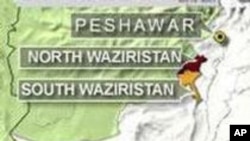Pakistani security officials say a suspected American missile strike near the Afghan border in northwestern Pakistan has killed 12 militants. The officials, speaking on condition of anonymity, say they believe the target was Pakistani Taliban leader Hakimullah Mehsud. But it is unclear whether Mehsud was killed.
The latest attack hit a militant training camp on the border between Pakistan's North and South Waziristan tribal region.
Following word of the missile strike, representatives for Pakistani Taliban leader Hakimullah Mehsud called local media, claiming the militant leader had escaped unharmed.
It is difficult to verify these claims because the area is largely autonomous and a known sanctuary for al-Qaida and Taliban militants.
Suspected U.S. missile strikes in Pakistan's northwest have killed several militant leaders, including the previous head of the Pakistani Taliban, Baitullah Mehsud, in mid-2009.
Security analyst Inam Wazir tells VOA that even if, Hakimullah Mehsud was killed, he does not believe it would not make much of a difference in the fight against militants. He says there are plenty of others left that could take Mehsud's place.
"There is a series of leadership - even eight to 10 great - in each and every tribal area in their own group," Wazir said.
Pakistan's military publicly has ignored North Waziristan, where mainly Afghan Taliban elements are located. Pakistan instead has focused its military efforts on South Waziristan, where the Pakistani Taliban is headquartered. That faction is blamed for launching attacks, largely within Pakistan.
The strike occurred as U.S. special envoy to the region Richard Holbrooke visits parts of Pakistan.
Late Wednesday, Pakistani Foreign Minister Shah Mahmood Qureshi addressed the media, alongside Holbrooke, saying there are certain "red lines" that the United States must not cross.
"Despite the partnership that we enjoy, Pakistan feels that it will undermine our relationship if there is [an] expansion of drones and if there are [military] operations on [the] ground," Qureshi said.
But Holbrooke sought to downplay Pakistani objections.
"We believe relations between the United States and Pakistan are better today than they were a year ago," Holbrooke said. "On the other hand, there are some obvious and very public issues between the two countries. That is natural. Friends can disagree."
Late last month, both the Pakistani and Afghan factions of Taliban separately claimed responsibility for a suicide bomber that killed seven U.S. intelligence agents in eastern Afghanistan.
Since then, the United States has intensified attacks with its unmanned aircraft, known as drones, in the Afghan border region. There have been seven strikes there this month.
Suspected US Drone Attack Kills 12 in NW Pakistan

It is unclear whether Pakistani Taliban leader Hakimullah Mehsud was killed in the attack.



